Summary
Summary
This programme covers the upland native pinewoods, oakwoods, birchwoods and mixed ashwoods as described in the respective Forestry Practice Guides (see below).
Research objectives
- To study the structure, composition and dynamics of upland native woodland ecosystems in order to evaluate the potential for utilising natural woodland processes, and mimicking natural woodland structure
- To develop models which aid the ecological design of new native woodlands including methods of establishment, planting patterns, design and site variability
- To investigate the reproductive biology of Scots pine, birch and oak in order to improve our ability to manipulate the process of natural regeneration
- To develop environmentally benign methods of controlling unwanted vegetation in native woodlands – principally Rhododendron ponticum.
Programme description
Major elements of research are:
- Stand Structure
Description of the structure and composition of existing native woodland remnants. Evaluation of their value in terms of models for future woodland management. - Establishment Practice
Studies of planting patterns, species composition and site suitability for component species and the interaction with conventional techniques such as cultivation and fertilisation. - Natural Regeneration
Investigations of seed production patterns, seed dispersal and viability. - Long Term Monitoring Sites
Establishment of permanent monitoring systems in representative areas of managed and unmanaged native woodland. - Ecological Site Classification (ESC)
Evaluation of ESC as an aid to planning new native woodlands. - Rhododendron Control
Efficacy trials of alternative methods for controlling the establishment and growth of Rhododendron in native woodlands.
Forestry Practice Guides
- Management of semi-natural woodlands – Upland mixed ashwoods
Forestry Commission Practice Guide 4 - Management of semi-natural woodlands – Upland oakwoods
Forestry Commission Practice Guide 5 - Management of semi-natural woodlands – Upland birchwoods
Forestry Commission Practice Guide 6 - Management of semi-natural woodlands – Native pinewoods
Forestry Commission Practice Guide 7
Other publications
- Managing the Pinewoods of Scotland
Handbook
Contact
For information on managing upland native woodlands contact:
For information on expanding upland native woodlands contact:
Funders and partners
![]()
This research is funded by the Forestry Commission Regeneration and sustainable silviculture programme.
Forestry Commission policy
The aims of Government forestry policy attach particular importance to the conservation of existing semi-natural woodlands and the creation of new native woodlands (Sustainable Forestry: The UK Programme). Specific research needs relating to native woodlands have also been identified under the UK Biodiversity Action Plan and are addressed within this programme. These relate mainly to the need to expand the range of long-term monitoring sites and to understand the process and rate of colonisation through natural regeneration.
Rationale for the management of upland native woodlands research programme
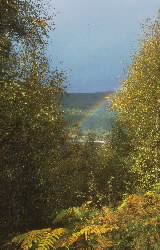 Apart from the native pinewoods, there has been little systematic research into the silviculture of native woodlands in upland Britain. Even in the pinewoods, research has been sporadic and has largely emphasised regeneration problems.
Apart from the native pinewoods, there has been little systematic research into the silviculture of native woodlands in upland Britain. Even in the pinewoods, research has been sporadic and has largely emphasised regeneration problems.
Existing native woodlands
The desire to utilise natural regeneration as the preferred means of securing the future of existing woodlands and extending their area necessitates a good understanding of the factors influencing its success. Although some aspects such as the deleterious effects of browsing animals are widely recognised, many others are much less clearly understood. As a result, successful regeneration is often not achieved.
Woodland restoration needs to be guided by information on the potential structure and composition of particular native woodland types. Although important advances have been made with the development of the National Vegetation Classification (Rodwell, 1991) and the Ecological Site Classification (Pyatt, 1995), detailed guidance and models of forest structure and composition for specific woodland types are still lacking.
The invasion of native broadleaved woodlands in Wales and the west of Scotland by Rhododendron ponticum has become a major barrier to regeneration, particularly in the native oakwoods. There is therefore a need for the development of effective and efficient methods of clearing and controlling its regrowth whilst avoiding damage to the existing tree cover and associated woodland environment.
Creation of new native woodlands
Guidance is available in:
- Forestry Commission Practice Guides
- Creating New Native Woodlands – Forestry Commission Bulletin 112.
The latter gives design prescriptions by NVC woodland community with information on appropriate sites, major and minor species, along with some discussion of woodland structure and pattern. More detailed, site specific guidance on aspects such as site variability and species choice, planting patterns, species mixtures and future stand development remains to be developed.
Understanding of the effects of establishment methods upon stand development is an area of importance in view of current policy of “the minimum site disturbance commensurate with satisfactory establishment”.
What’s of interest
Forestry Commission Practice Guides:
The management of semi-natural woodlands: 4. Upland mixed ash woods
The management of semi-natural woodlands: 5. Upland oakwoods
The management of semi-natural woodlands: 6. Upland birchwoods
The management of semi-natural woodlands: 7. Native pinewoods
Managing the Pinewoods of Scotland
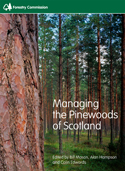 Handbook
Handbook
Our native pinewoods have long been treasured for their landscape and cultural values, as well as their contribution to the economy through timber production and recreational activities. Following decades of exploitation and degradation, recent management has concentrated primarily on the conservation of what remained of these ancient semi-natural woodlands.
The aims of this handbook are to promote the maintenance and expansion of our existing native pinewoods, encourage the integration with plantations within the pinewood zone, and support the creation of new native pinewoods.
The authors, drawn from the Native Pinewoods Managers’ Group and others knowledgeable about Scottish pinewoods, conclude that these aims are best achieved by focusing attention on the management of the pinewood ecosystem as a whole, rather than on individual species, since the future of the latter can be most readily assured if the ecosystem is in good health.
The Native Pinewood Managers’ Group
This was formed in 1991 to review the range of management objectives for the Scottish pinewoods, discuss management and monitoring techniques, and act as a source of advice and knowledge for new managers. The Group holds an annual field excursion, the reports of which are published in Scottish Forestry and the Native Woodland Discussion Group’s newsletter.
What’s of interest
The handbook costs £25 and can be ordered from:
Forestry Commission Publications
P.O.Box 25
Wetherby
West Yorkshire
LS23 7EW
Tel: 0870 121 4180
Fax: 0870 121 4181
E-mail: forestry
@twoten.press.net
Rhododendron control
Background
 Rhododendron ponticum (L.) is a non-indigenous evergreen shrub belonging to the Ericaceae family. It was originally introduced by Conrad Loddiges as seed in 1763 to be used as a cultivated flowering plant in gardens, parks, and estates as a horticultural exhibit, but was also extensively planted in western Victorian hunting Estates under woodland canopies and on heathland areas to provide shelter for game species. They also used Rhododendron ponticum as a rootstock for grafting scions from less hardy but more colourful stock from places such as China and the Himalayas.
Rhododendron ponticum (L.) is a non-indigenous evergreen shrub belonging to the Ericaceae family. It was originally introduced by Conrad Loddiges as seed in 1763 to be used as a cultivated flowering plant in gardens, parks, and estates as a horticultural exhibit, but was also extensively planted in western Victorian hunting Estates under woodland canopies and on heathland areas to provide shelter for game species. They also used Rhododendron ponticum as a rootstock for grafting scions from less hardy but more colourful stock from places such as China and the Himalayas.
Origin
It has been determined through DNA analysis of naturalised ‘wild type’ R. ponticum, that most if not all of the invasive bushes in the British Isles originate from the Iberian Peninsula. A degree of backcrossing with the two species R. maximum and R. catawbiense, proves that our invasive R. ponticum plant in the British Isles is a hybrid species.
Growing conditions
R. ponticum grows particularly well in the climate and soils of the British Isles, showing a preference for acidic soils in areas of high humidity, a combination found predominantly on the west of Britain and Ireland. An association with a mycorhizal fungus enables it to assimilate nutrients more effectively than associated species.
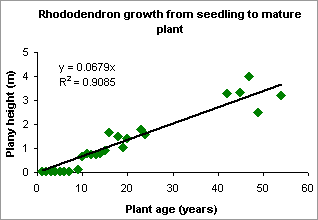
Impact
Although it possesses attractive flowers R. ponticum has few attributes that offset the negative impact it can have on an invaded site. It has been shown to reduce the numbers of earthworms, birds and plants and regenerative capacity of a site, leading to a reduction in the biodiversity of the area. Physical access to a site can be reduced by the density and size of mature bushes, and management costs then rise as the bushes need to be treated prior to other activities being carried out. Established bushes then act as a seed source for further invasions in adjacent areas, eradicating ground cover plants and interfering with the process of natural regeneration of trees.
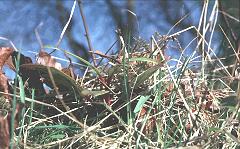
Control options
Control of R. ponticum invasion in woodland is often the first operation in the restoration of native habitats. The choice of control/eradication method can influence the recovery of the site, and this should be considered when planning any operations. Control options that include the complete or partial removal of R. ponticum shoots before herbicide control will allow faster re-invasion of plants, especially if coupled with ground disturbance. The speed of recovery is also dependent on a local source of viable propagules.
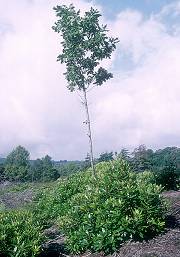
Stem injection control
A stem injection control method has been successfully trialled in Western Scotland and Wales.
The removal of the largest plants has until now posed the greatest challenge and expense to managers, their continued presence in the environment the greatest threat to the species’ long-term eradication, as mature bushes can produce up to a million seeds a season, continually re-invading surrounding habitats.
Injecting herbicide directly into the stems of large rhododendron results in their death within six months. Not only is the dead material then easier to remove, but the application of the herbicide is more precise than in traditional methods, uses less product producing overall cost savings.
At Inverewe gardens, the National Trust for Scotland, famous for their extensive Rhododendron collection, has recently been using the stem injection method to control seedlings from their hybrid Rhododendron ponticum windbreaks invading surrounding woodlands.
What’s of interest
West Scotland control project
Call for joint effort to tackle rhododendron ponticum
Landowners and managers across the west of Scotland are invited to join a pro-active effort to tackle rhododendron ponticum to benefit business, communities and biodiversity.
Contract report
Technical seminar presentations
Survey methodology and findings (PDF-2051K)
Costs and priorities (PDF-1317K)
Control best practice (PDF-1556K)
Argyll_Bute_rhododendron_2008_pk_update_Scotland.pdf (PDF-1970K)
Related pages
Upland native woodland types and area covered by management of upland native woodlands research
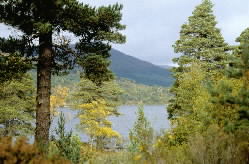 This programme covers the upland native oakwoods, pinewoods, birchwoods and mixed ashwoods as described in the respective Forestry Practice Guides.
This programme covers the upland native oakwoods, pinewoods, birchwoods and mixed ashwoods as described in the respective Forestry Practice Guides.
Native woodland area
Over 85% of the native woodland area (not including planted woodlands of native species) in Scotland is found in the Highland Region. Of the total of just under 105 000 ha:
- 51% consists of birch
- 20% Scots pine
- 14% oak
- Other species each covering less than 2%.
In addition, there are over 45,000 ha of native oakwoods in northern England and Wales.
Upland sem-natural woods have declined in area by 30 to 40% over the last 50 to 60 years.
As a consequence of the increased priority given to native woodlands, the area is being expanded through new planting and the extension of existing woods by natural regeneration. In 1995/96 grant aid under the Woodland Grant Scheme was approved for 8 400 ha of broadleaved planting (nearly all native spp.), and 2 700 ha of native Scots pine. In addition, approval was granted for operations to secure natural regeneration on a further 4 100 ha (mainly native pine).
Oakwoods
Upland oakwoods have declined by 7% since the 1930s with a further 38% replanted with non-native species (Biodiversity Action Plan, 1995). Many of our current upland oakwoods are degraded remnants that are a consequence of the decline in management of coppice woods. Individual woods are typically overgrazed and invaded by Rhododendron ponticum.
Birchwoods
The area under birch has also been substantially reduced compared with previous distribution of native woodland. Many existing birchwoods are typically unmanaged and in poor condition, with overgrazing from deer and sheep and a lack of natural regeneration.
Pinewoods
The native pinewoods which once covered approximately 1.5 million ha of Highland Scotland, are now reduced by only 16 046 ha represented by 77 individually recognised pinewoods (FC Caledonian Pinewood Inventory, 1994). More than 9,000 ha are contained in only seven major woodlands:
- Abernethy
- Mar
- Rothiemurchus
- Black Wood of Rannoch
- Glen Affric
- Glen Strathfarrar
- Glen Tanar.
Of the remaining 70 woods, 33% are degraded remnants of 20 ha or less, and many consist only of scattered individual trees.
What’s of interest
Forestry Practice Guides:
Upland ashwoods
Upland oakwoods
Upland birchwoods
Native pinewoods
General Content
What’s of interest
The following publications are available from The Stationary Office:
Biodiversity: the UK Action Plan
